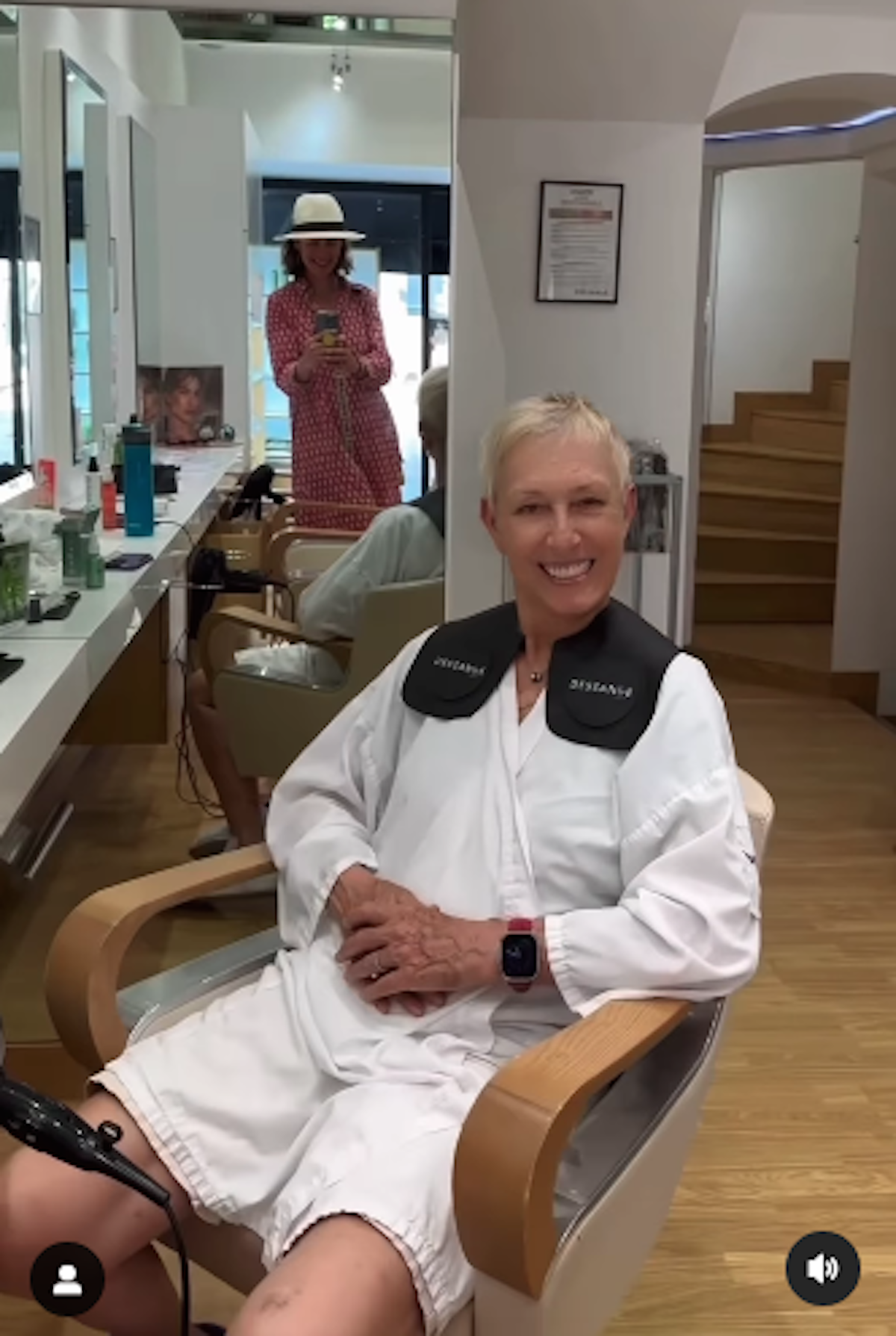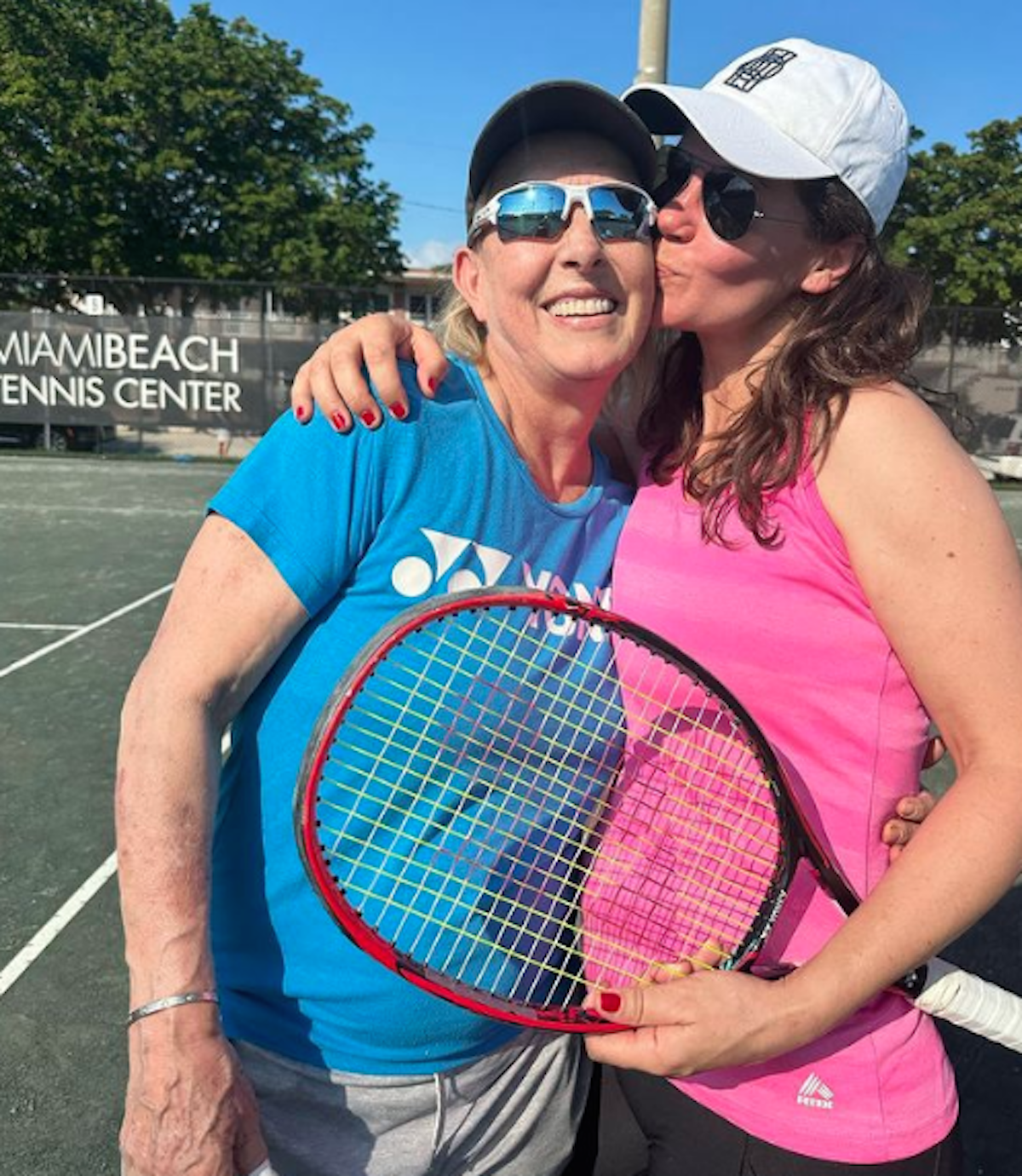Strength Through Cancer
- Tennis Legend Martina Navratilova, 66, pushed past her fears over the weekend and responded to adversity with strength by getting what she calls an “FU Cancer haircut.”
- Navratilova, who is now officially cancer free after receiving the "all clear" earlier this year after battling throat and breast cancer, is an inspiration to anyone battling cancer as she’s continuing to face her fears and exude positivity.
- Although the tennis star has voluntarily chose to cut her hair as an “FU” to cancer, losing hair or thinning hair while undergoing chemotherapy is a common side effect. And while hair loss is not a medically significant or dangerous side effect of chemotherapy, for many women it can be a blow to their self-esteem.
- "It can have implications about how they feel about themselves," says Dr. Renata Urban, a gynecologic oncologist at the University of Washington in Seattle.
The now cancer-free Czech-American sports superstar, an 18-time Grand Slam singles champion and nine-time Wimbledon champion, has pushed past her fears and responded to adversity with strength by getting what she calls an “FU Cancer haircut.”

Once the hairstylist finished up, Navratilova turned toward the camera and happily insisted, “I’m loving it!”
Managing Hair Loss During Cancer Treatment
- If You’re Looking For Ways To Deal With Hair Loss During Cancer, You’re Not Alone
- How to Slow Hair Loss During Chemotherapy for Ovarian Cancer
- Preventing Hair Loss During Chemotherapy: Scalp-Cooling Devices
- Chemotherapy Side Effects – Hair Loss
- Not Your Parents’ Chemotherapy: New Solutions for Nausea, Hair Loss, and Other Chemo Side Effects During Ovarian Cancer Treatment
Alongside the inspirational video clip, Lemigova wrote, “Life is a journey full of ups and downs, twists and turns, and unexpected challenges. But it is in those difficult moments that we find our true strength and resilience.
“Change is inherent to life. As we navigate these changes, it's important to remember that we have the power to choose our response.”

She continued, “The journey of overcoming cancer is one that is filled with both highs and lows. But by embracing the power of positivity and choosing to respond with strength and determination, we can find hope and healing in even the darkest of moments.
“Today, we celebrate the strength of those who have overcome cancer and the power of love that helps us get through it all. My wife Martina, just beat two cancers at the same time, and I couldn't be more proud of her strength and determination. Her courage and grace inspire me every day.”
Lemigova, who also admitted to loving her wife’s new hairdo, said the haircut was “a reminder of how far we have come.”
“It is a symbol of hope and a celebration of life. We are grateful for each and every moment, and we know that we are stronger together than we could ever be alone,” Lemigova explained.
“To all of you who are fighting your own battles, know that you are not alone. You are loved, you are supported, and you are stronger than you know. Keep fighting, keep pushing, and never give up hope.”

Fans took to the comments section to praise Navratilova on her stylish new do, with one writing, “The new haircut looks absolutely fantastic really suits Martina. She has been on a real journey and is a real inspiration for facing things head on and never gave up fighting.”
“I'm dealing with cancer right now, and I find Martina's story so inspiring. Long time fan and I hope to channel some of that strength,” a second fan commented.
RELATED: 6 Cancer Survivors Tell Us How They Stay Hopeful During Difficult Times
While a third Navratilova supporter wrote, “That smile! That smile radiates warmth and strength. You look wonderfully vital… and you rock that fantastic haircut. Keep being Martina.”
Martina Navratilova's Cancer Journey
When Martina Navratilova announced in January 2023 that she had stage 1 throat cancer, she wrote, "The prognosis is good and I will start … treatment this month. The cancer type is HPV and this particular type responds really well to treatment."
She was referring to the human papillomavirus, the most common sexually transmitted disease, which raises your risk of several cancers, including throat.

The statement also noted that the cancer was found after Navratilova discovered an enlarged lymph node on her neck while she was at the WTA finals in Fort Worth, Texas.
It was then, while undergoing testing for her throat, that a suspicious lump was detected in her breast, which was "subsequently diagnosed as cancer, completely unrelated to the throat cancer."
Thankfully, both cancers were found in early stages and had good prognoses, as per the statement.
Navratilova, who is now officially cancer free after receiving the "all clear" returned to her job with the Tennis Channel just in time for the Miami Open in March.
Meanwhile, Navratilova's recent cancer battle was not the only time Navratilova faced a disease. She was first diagnosed with ductal carcinoma in situ (DCIS), a noninvasive form of breast cancer, in 2010.
DCIS means abnormal cells in the breast milk duct have become cancerous but have not yet metastasized, or spread, to other parts of the body.
A Grand Goal: 4 Steps to Overcoming Adversity
During this time, Navratilova underwent radiation and a lumpectomy treatment (when a surgeon removes a portion of cancerous breast tissue).
For more information on this disease, SurvivorNet is proud to offer a large resource center on Breast Cancer, treatment options, and the latest advancements that are changing lives today.
Finding Joy Amid Cancer
When faced with a cancer battle it can be hard to focus on life outside of your disease. But it's important to remember that your mental state can actually impact your success as a patient.
Determination & Hope Despite Setbacks Prevail in "Climbing Blind"
"I'm pretty good at telling what kind of patients are going to still have this attitude and probably going to live the longest, even with bad, bad disease," Dr. Zuri Murrell, a colorectal surgeon at Cedars-Sinai Medical Center, previously told SurvivorNet. "And those are patients who, they have gratitude in life."
RELATED: Stay Positive, It Matters
Dr. Dana Chase, a gynecologic oncologist at Arizona Oncology, also advocates for cancer warriors to prioritize their mental health. She noted that emotional well-being has been studied as a factor in patient outcomes.
"We know from good studies that emotional health is associated with survival, meaning better quality of life is associated with better outcomes," Dr. Chase told SurvivorNet in an earlier interview.
"So, working on your emotional health, your physical well-being, your social environment [and] your emotional well-being are important and can impact your survival," she explained.
"If that's related to what activities you do that bring you joy, then you should try to do more of those activities."
There are no right or wrong answers, but Dr. Chase says doing things that bring you joy is important.
What Still Brings You Joy? Your Emotional Health is So Important
She recommends writing down ten things that make you happy and intentionally making the time to do those activities throughout the day.
Hair Loss Amid Cancer
Losing hair or thinning hair while undergoing chemotherapy is a common side effect. And while hair loss is not a medically significant or dangerous side effect of chemotherapy, for many women it can be a blow to their self-esteem.
"It can have implications about how they feel about themselves," says Dr. Renata Urban, a gynecologic oncologist at the University of Washington in Seattle.
What You Think You Know About Chemotherapy Side Effects May Be Wrong
As for Salt Lake City resident Stephanie Hess, she already knew what to expect after getting diagnosed with stage 3 ovarian cancer. She had seen her mother and some friends go through it and was devastated over the thought of losing her hair.
“Because my mom had passed away from cancer, I knew what it felt like…The thought of losing your hair, that's the ultimate indicator of being a cancer patient," she told SurvivorNet in an earlier interview. "I didn't want to be bald."
Hair loss during treatment occurs due to the drugs targeting quickly dividing cells throughout the body. Both cancer cells and hair cells fall into this category. Women may also lose their eyebrows and eyelashes, too. All of this hair loss can have a big effect on your self-esteem.
Making Peace With Hair Loss Stephanie Hess Shares Her Ovarian Cancer Story
For most cancer patients, the hair will start growing back shortly after treatment, and in the meantime, some cancer patients choose to embrace their new look.
MORE: Coping With Chemo-Related Hair Loss
While hair loss can be very difficult to deal with, many women eventually consider it an empowering part of their cancer fight. Thinking of hair loss as a temporary setback rather than a permanent problem can help some women, and men, make peace with it.
"For cancer patients losing one's hair can be unbelievably stressful. To start with, the dread of losing one's hair can lead to some sleepless nights and feelings of anxiety," Dr. Samantha Boardman, a New York-based psychiatrist and author, told SurvivorNet.
To cope, Dr. Boardman suggested reaching out to other survivors who have been through a similar situation if you feel comfortable doing so.
"Talk to people who have been through it, get their advice, voice your concerns to your caregiver and see what they can do," Dr. Boardman added. She stressed that anxiety over hair loss doesn't just affect women, as men going through cancer often struggle with it as well.
For those who can't stand the idea of being seen without their hair, there are plenty of options available, such as wigs, head wraps, and hats. Some survivors have even created products specifically for people with cancer so they can feel comfortable in their own skin.
Dr. Boardman also noted that some people may not feel comfortable talking about hair loss, and that's OK, too.
"To encourage them to bring that up, to encourage them to talk about it, I think can be very helpful," she said. "But also, for patients, it might be something that they don't talk about. [And they should] feel good and strong about saying, 'This is something that I don't feel like discussing right now, and I'll let you know when I do.’"
Questions to Ask Your Doctor
If you're in the midst of a cancer battle and experiencing hair loss, here are some questions you may consider asking your doctor:
- Are there any treatments to help manage or minimize my hair loss?
- What are scalp-cooling devices and how do they work?
- Do you recommend scalp-cooling devices?
- What other options are available to help me cope with hair loss?
- Can you recommend a wig maker?
- I'm struggling mentally with my hair loss, can you recommend a therapist to talk to?
- How can I find a local support group with people going through similar things?
Contributing SurvivorNet Staff
Learn more about SurvivorNet's rigorous medical review process.

